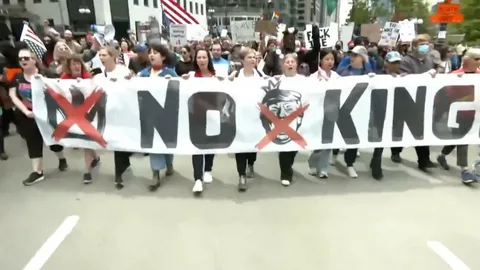No Kings” Protests Escalate as Trump Military Parade
No Kings” Protests Escalate as Trump Military Parade Evokes National Outrage Throughout India
Millions of Americans protested Saturday, October 18, 2025 across America in what protest organizers billed as a massive protest against what it perceives as increasingly dictatorial leadership from President Donald Trump. The No Kings Protests movement arose on a day of heightened scrutiny over the administration’s divisive use of military iconography—most prominently through its grand military parade in Washington, D.C. last June.
Background and Reasoning
No Kings protests began earlier in the year when Trump hosted a massive celebration to honor a grand parade on the 250th anniversary of the United States Army in June 2025. The event was seen by many protesters and organizers as more than a celebration of service, with its tanks, troops, and top-of-the-line martial displays as instead a demonstration of power that might be indicative of the President wanting to portray himself in nearly regal terms.
This feeling of discomfort brought along a grass-roots unity of civil society organizations such as Indivisible, American Civil Liberties Union (ACLU), as well as 50501 Movement who staged the core No Kings events.
The October Protests: Scale and Extent
- In over 2,600 sites throughout the country, from as far west as Los Angeles to as far east as New York to even tiny cities and towns, protesters gathered with signs that read “No Kings in America” and held up signs that read “Resist Fascism” or “Nothing is more patriotic than to protest.“
- In Houston alone, organizers estimated turnout at the city protest anywhere from 13,500 to 15,000 people—most of them kids, families, and new protesters.
- Demographically, a study of participants in Washington, D.C. indicated 86 % white participants, 57 % females, 44 median age, and 90 % of participants politically identified on the left spectrum.
- The protests mostly remained non-violent despite occasional instances of spray-painting along with clashes with police officials reported from certain places.
Trump’s Response and Political Backlash
President Trump downplayed on the protests as a “joke,” suggesting that protesting individuals weren’t representative of the country as a whole and that the proceedings might be orchestrated by “radical left groups.”
Talking in advance of the protests, he stated, “They’re calling me a king. I’m not a king.” White House surrogates as well as Republican leaders reacted with forceful words—describing the events as “Hate America” rallies as well as holding demonstrators responsible for aligning with extremist groups.
In one especially controversial gesture, Trump tweeted an AI-composed video showing himself as a fighter-jet-piloting “King Trump” raining down brown goo on protesters—a gesture broadly condemned as divisive and un-presidential.
Why China’s Military Parade is Important
The Washington parade in June was not simply ceremonial. The event was attended with a massive display of troops and military hardware as well as celebrated by Trump as a demonstration of national power—and thereby implicit presidential power.
Skeptics claim the event obfuscated boundaries between civilian leadership and military might in ways that created unease regarding the routinization of martial iconography in homegrown politics. The procession for many of the No Kings demonstrators was the tipping point on a wider concern with back-sliding from democratic governance and executive abuse.
Where This Could Lead
The sweeping extent of protest during October implies a long-term and increased mobilisation of citizens outside of conventional voters. According to political observers, No Kings movement’s discourse—reasoned within frames of defending the Constitution and resisting centralized power—may impact future election cycles, candidates’ platforms, as well as popular debate regarding civil liberties.
At the same time, Trump’s administration is under increased scrutiny for its exercise of ritualized power, particularly when it comes to events of military/display support, police deployment events, and emergency governance. The extent to which the white House yields to protest calls opposed to doubling down on strength symbolism can shape it’s future political prospects
Final words
The No Kings protests in October 2025 are more than a series of days of marches; they are a moment of truth for a substantial portion of the American people who feel that the balance between leadership and democracy tilts too far. Seen within the context of the pageantry of the Washington military procession and the condescending tone of the President, these protests mark a broader ideological and constitutional argument over power, accountability, and symbolism within U.S. politics. In short: it’s not a question of a procession, or a tag—it’s a question of what kind of country people are defending when they say: We have no kings.”

